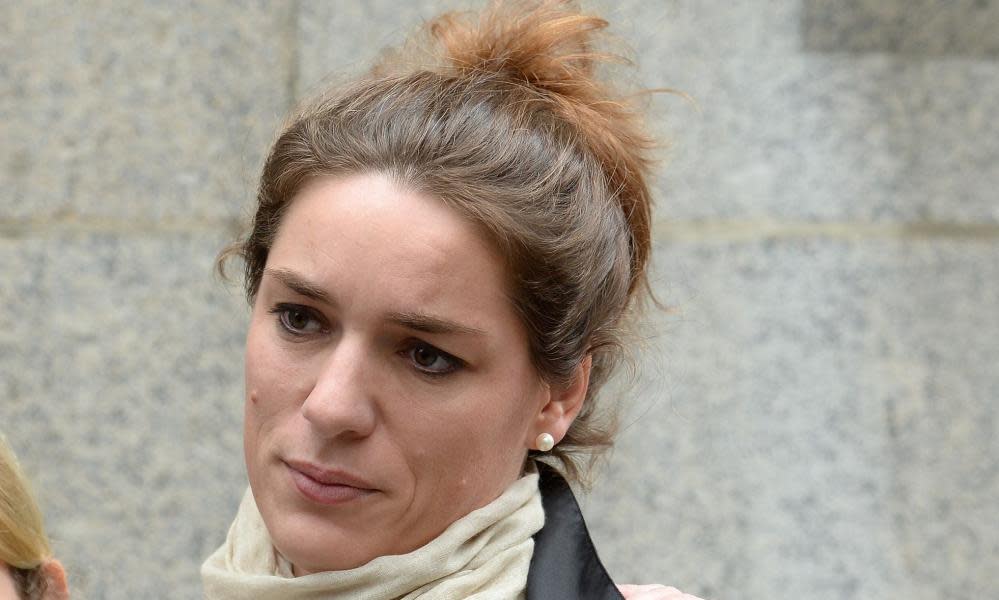Widow of academic killed in London denied legal aid for inquest

The widow of a man stabbed to death in a random attack outside his London home has been denied legal aid to be represented at his inquest, which is set to explore the actions of police, prosecutors and mental health professionals leading up to his death.
Jeroen Ensink, 41, was killed in December 2015 by student Femi Nandap, 23, who had paranoid schizophrenia, and just days earlier had knife and assault charges against him dropped.
The internationally renowned water engineer and academic had gone out to post cards to inform family and friends of the birth of the couple’s daughter, Fleur, born 11 days earlier.
His widow, Nadja Ensink-Teich, 37, has made a plea for donations on crowdjustice.org to fund legal representation.
After a pre-inquest hearing at St Pancras coroner’s court on Tuesday, she said the police and Crown Prosecution Service had questions to answer over what they knew about Nandap’s mental health before the attack, and whether a chance to protect the public had been missed.
“We have been given very little information and don’t have the full facts yet. It is clear that police and the CPS, and possibly other agencies, have questions to answer,” she said outside the hearing.
“I’ve been denied legal aid, although both CPS and the police are legally represented, the police by a QC. That’s unfair. I sincerely hope that this process will provide answers. I want justice for Jeroen and also for Fleur.”
The senior coroner for inner north London, Mary Hassell, said the article 2 inquest would examine not just by what means Ensink died, but would also examine in what circumstances.
Expressing her concern that legal aid had been denied, Hassell said: “I regard this as an extremely complex inquest … It raises not simply the emotional backdrop, which is devastating for those concerned, but it raises complicated legal issues.”
The inquest, due to be heard in November, will examine decisions taken by police, prosecutors and mental health professionals. It will “look at events leading up to Mr Nandap being in the place he was at the time he was with a knife,” said Hassell.
Nandap, who repeatedly stabbed Ensink in the chest and back, was experiencing psychosis at the time of the killing, in Islington, north London. He had been arrested seven months previously for allegedly possessing a knife and assaulting a police officer.
Those charges were dropped six days before Nandap killed Ensink, an acclaimed researcher and senior lecturer in public health engineering at the London School of Hygiene and Tropical Medicine. He was killed outside his home, where his wife was inside caring for their newborn baby. She has since moved back to the Netherlands, where the couple are from.
On her Crowdjustice page, Ensink-Teich said a number of serious and significant concerns had been identified and she hoped the coroner would investigate them.
“I won’t be able to effectively participate in the investigation into the death of my husband and father of my daughter,” she said.

Ensink-Teich, 37, a former events manager, has called for a full independent investigation into the circumstances that led to her husband’s death. She believes it highlights failures in the health and judicial system. She said the inquest was in the wider public interest because she hoped it would explore flaws in the system, which could reduce the number of killings committed by people with serious mental illness.
Nandap pleaded guilty to manslaughter on the grounds of diminished responsibility and was sentenced in October last year to an indefinite hospital order at Broadmoor.
The Old Bailey heard that the Nigerian-born student who lived in Woolwich, south London, had heard voices urging him to sacrifice a man. He believed he was “the chosen one” or the “black Messiah”. On the day of the killing he was visiting his sister, who lived on the same road as Ensink and his family.
He was described in court as an intelligent young man who did well at school, but who became mentally unwell while studying accountancy in the US in 2012, where he started to use cannabis regularly.
After the sentencing, the CPS said earlier charges against Nandap had been dropped because of insufficient evidence. A spokesman said at the time: “Even if the case had proceeded, the bail conditions he was subject to until his trial would not have prevented him being at the location of the attack on Ensink on 29 December.”
Nandap had breached his earlier bail conditions by not returning from a trip to Nigeria on the agreed date.
A statement from campaign group Inquest said: “No bereaved family should be left in a position where they have to fundraise to pay for legal representation at an article 2 inquest, where public authorities engage lawyers to defend or justify their own conduct. This is a point of principle and there needs to be equality of arms.”
The case raised serious questions about multi-agency failures, the statement added.

 Yahoo News
Yahoo News 
